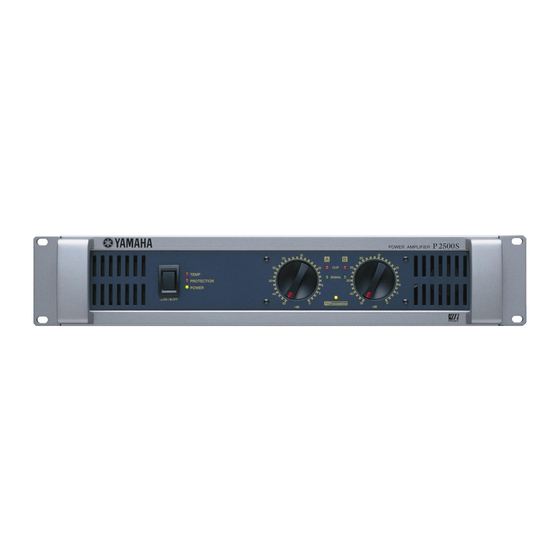Yamaha P7000S - Amplifier 소유자 매뉴얼 - 페이지 5
{카테고리_이름} Yamaha P7000S - Amplifier에 대한 소유자 매뉴얼을 온라인으로 검색하거나 PDF를 다운로드하세요. Yamaha P7000S - Amplifier 16 페이지. Yamaha power amplifier owner's manual
Yamaha P7000S - Amplifier에 대해서도 마찬가지입니다: 소유자 매뉴얼 (16 페이지), 소유자 매뉴얼 (16 페이지), (프랑스어) 마누엘 디렉션 (16 페이지), (러시아어) 사용자 설명서 (16 페이지), (일본어) 사용 설명서 (16 페이지)

Thank you for your purchase of the YAMAHA KAX-5000, KAX3500 or KAX-2500 power amplifier.
These KAX-series amplifiers fully incorporate Yamaha's renown technological expertise, and offer
high reliability, rock-solid stability, and superb acoustic characteristics-all in a trim, 2U-sized pack-
age.
Features
• With two types of input jacks (balanced XLR and balanced phone) and three types of output jacks
(Speakon, 5-way binding post, and phone), the KAX-series is suitable for a wide variety of applica-
tions and installed systems.
• The unit offers three operating modes: STEREO (where Channels A and B operate independently),
PARALLEL (where the unit outputs a mono source through twin amplifier systems), and BRIDGE
(where the unit operates as a single high-power amp).
• Each channel is equipped with an independent OFF/LOW CUT/SUBWOOFER switch-where LOW
CUT engages a high-pass filter, and SUBWOOFER engages a low-pass filter. With LOW CUT or
SUBWOOFER selected, you can adjust the cutoff frequency from 25 to 150 Hz.
• Each channel has its own SIGNAL and CLIP indicators.
• The PROTECTION indicator lights up-and sound output is automatically muted-whenever the
unit's protective circuitry is operating. The TEMP indicator lights up if the unit is running hot.
• Variable-speed low-noise fans ensure high reliability.
This Owner's Manual covers the three models: KAX-5000, KAX-3500 and KAX-2500 power amplifi-
ers. Please read through this manual carefully before beginning use, so that you will be able to take full
advantage of the amplifier's superlative features and enjoy trouble-free operation for years to come.
After reading through the manual, please store it in a safe place.
Introduction
Contents
Controls and Functions ..................................... 6
Speaker Connections ........................................ 9
Rack Mounting ................................................ 11
Specifications .................................................. 12
Troubleshooting ............................................... 15
Front Panel .......................................................... 6
Rear Panel ........................................................... 7
Speaker impedance ............................................. 9
Wiring ................................................................ 10
General Specifications ....................................... 12
Block Diagram ................................................... 13
Dimensions ........................................................ 14
Current Draw ..................................................... 14
5
